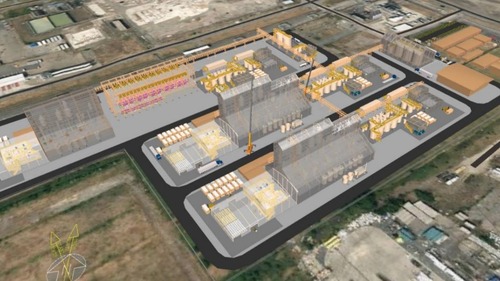
Alkemy Capital Investments has completed a feasibility study for a proposed lithium hydroxide processing facility in the UK. The facility, to be developed by Alkemy's subsidiary Tees Valley Lithium, will produce a low-carbon footprint, battery-grade lithium hydroxide product for the European battery market. Currently, Europe has no lithium hydroxide production capacity, and China controls 90% of the world's supply. The project aims to supply 15% of European hydroxide demand by 2030 and reduce the carbon footprint associated with lithium production and transportation. The feasibility study indicates a post-tax NPV8 of £2.2bn and a post-tax IRR of 32.9%.
Alkemy Capital Investments plc (“Alkemy”) recently announced the completion of a feasibility study for a proposed UK-based, world-class lithium hydroxide processing facility. Alkemy’s wholly-owned subsidiary, Tees Valley Lithium (“TVL”) is seeking to develop this independent and sustainable lithium hydroxide facility at the Wilton International Chemical Park in the Teesside Freeport, UK.
The first of its kind in the UK, the planned plant will process a variety of lithium feedstocks to produce a lowcarbon footprint, battery-grade lithium hydroxide product suitable to supply the rapidly expanding European battery market for electric vehicles and renewable energy storage.
Rationale
Despite Europe being set to host >35 battery gigafactories by 2035, the current lithium hydroxide (LiOH) production capacity in Europe is zero. LIOH is continuing to gain ground as the lithium chemical of choice within the electric vehicle (“EV”) industry due to the adoption of NCM (Li-Ni-Co-Mn) and NCA (Li-Ni-Co-Al) cathode chemistries. This is especially pertinent for nickel-rich cathode chemistries (e.g. NCM 8:1:1) which can be preferable for higher energy density but typically require LiOH to provide chemical stability. The elephant in the room is that although EVs are part of the push towards a greener economy, they are far from carbon neutral. In fact, we understand that EVs roll off the production line with a 5-7 year carbon deficit to reach parity with internal combustion engine vehicles. This is a result of the significant carbon footprint of mining, processing and transportation of the critical metals required. China currently controls 90% of the world’s LiOH supply by hosting the lion’s share of hydroxide conversion capacity. A considerable carbon footprint is created by hard rock spodumene miners shipping a concentrate containing a mere ~6% Li2O for downstream conversion to hydroxide in China before further onwards transport to battery manufacturers in Europe and beyond. Herein lies the opportunity for Alkemy…
1st Lithium Hydroxide facility in the UK
TVL plans to develop the first major low-carbon lithium hydroxide monohydrate (LiO2 · H2O) or “LHM”) plant in the UK. The Class 4 feasibility study sets out a route to produce a high specification, battery quality LHM product for sale directly into the European battery market. The differentiating factor is that TVL plans to build a modular plant capable of processing a wide range of imported, low-carbon lithium feedstocks including lithium sulphate and lithium carbonate with the plan to supply 15% of European hydroxide demand by 2030. TVL is in advanced discussions with several feedstock suppliers. The shipping of higher intrinsic value primary lithium sulphate rather than spodumene drastically reduces the logistics/shipping carbon footprint. TVL is also in discussions with OEMs and battery manufacturers to secure customers for 100% of its production.
Project overview
The feasibility envisages production of 96,000tpa of battery-grade LHM via staged/modular development. This will comprise 4 processing trains, each with a 24,000tpa capacity. Train 1 will follow a conventional Glauber’s Salt process route, with the remaining trains based on a low-carbon electrochemical route which is well suited to sites with access to low-cost, renewable power. A considerable amount of metallurgical testwork has already been completed by leading lithium laboratories and has yielded ultra-pure LHM exceeding industry standards in addition to other saleable by-products. The proposed location; a Freeport zone within an established chemicals park proximal to the UK’s 5th largest port provides a range of incentives and direct access to the burgeoning European market. Powered by renewable offshore wind and dedicated to low waste, TVL will be a 100% certified green energy operation from day zero.
Feasibility metrics
The Class 4 Feasibility Study undertaken by Wave International indicates a 30- year operation and peak production of 96,000tpa LHM generating gross revenues of £49.2bn over project’s life. Initial capital cost for Train 1 is estimated at £216m including a 17.5% contingency. The feasibility indicates a post-tax NPV8 of £2.2bn, a post-tax IRR of 32.9% and a 26% EBITDA margin based on a long-term lithium sulphate feedstock price of US$10,000/t and long-term lithium hydroxide price of US$25,000/t. The pre-tax payback period for Train 1 is estimated at a mere 2.9 years.
Timeline
TVL anticipates a fast-track timeline to first production given there is no requirement to drill-out, develop and permit a mining operation. Post permitting, procurement and financing, main construction is slated to take only 12 months which based on current timelines indicates commercial production from Q4 2024. Alkemy has an unrivalled opportunity to become a first mover in the European lithium hydroxide space and make significant inroads to reducing the carbon footprint of lithium products that Europe will require in large quantities, but as yet lacks sources of domestic production. We believe Alkemy’s disruptive and unique strategy is a highly compelling way to play the fundamental and unavoidable transition to battery vehicles and growing demand for renewable energy storage.